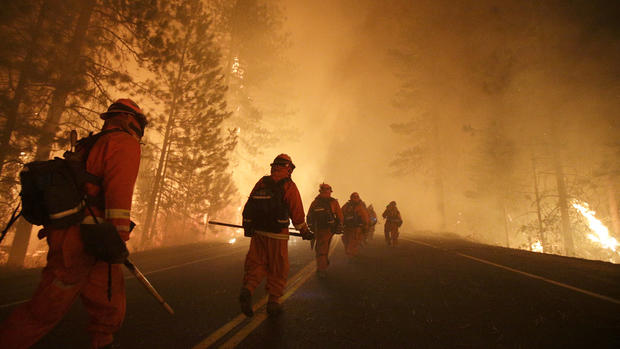Yosemite fire "poses every challenge there can be"
Updated 11:04 PM ET
GROVELAND, Calif. At Ike Bunney's dude ranch near the Sierra community of Tuolumne City, all creatures have been evacuated as firefighters brace for an intense battle to keep a wildfireraging north of Yosemite National Park out of mountain communities.
"We've already evacuated the horses," said Bunney, who was keeping an eye on his Slide Mountain Guest Ranch on Sunday. "I think they're worried about the fire sparking over these hills."
As fire leapfrogs across the vast, picturesque Sierra forests, moving from one treetop to the next, residents in the fire's path are moving animals and children to safety.
The fire has moved northeast away from Groveland, where smoke gave away to blue skies Sunday. But at Tuolumne City's Black Oak Casino in Tuolumne City, the slot machines were quiet as emergency workers took over nearly all of the resort's 148 hotel rooms.
"The casino is empty," said casino employee Jessie Dean, who left her four children at relatives' homes in the Central Valley. "Technically, the casino is open, but there's nobody there."
Hundreds of firefighters were deployed Sunday to protect Tuolumne City and other communities in the path of the Rim Fire. Eight fire trucks and four bulldozers were deployed near Bunney's ranch on the west side of Mount Baldy, where two years of drought have created tinder-dry conditions.
"Winds are increasing, so it's going to be very challenging," said Bjorn Frederickson, a spokesman for the U.S. Forest Service.
The fire continues burning in the remote wilderness area of Yosemite, but park spokesman Tom Medena said it's edging closer to the Hetch Hetchy Reservoir, the source of San Francisco's famously pure drinking water.
Despite ash falling like snowflakes on the reservoir and a thick haze of smoke limiting visibility to 100 feet, the quality of the water piped to the city 150 miles away is still good, say officials with the San Francisco Public Utilities Commission.
The city's hydroelectric power generated by the system has been interrupted by the fire, forcing the utility to spend $600,000 buying power on the open market.
Park employees are continuing their efforts to protect two groves of giant sequoias that are unique the region by cutting brush and setting sprinklers, Medena said.
The fire has consumed nearly 225 square miles of picturesque forests. Officials estimate containment at just 7 percent.
"It's slowing down a bit, but it's still growing," Frederickson said.
Fire lines near Ponderosa Hills and Twain Hart are being cut miles ahead of the blaze in locations where fire officials hope they will help protect the communities should the fire jump containment lines.
"There is a huge focus in those areas in terms of air support and crews on the ground building fire lines to protect those communities. We're facing difficult conditions and extremely challenging weather," Frederickson said.
The high winds and movement of the fire from bone-dry brush on the ground to 100-foot oak and pine treetops have created dire conditions.
"A crown fire is much more difficult to fight," said Daniel Berlant of the California Department of Forestry and Fire Protection. "Our firefighters are on the ground having to spray up."
The blaze sweeping across steep, rugged river canyons quickly has become one of the biggest in California history, thanks in part to extremely dry conditions caused by a lack of snow and rainfall this year. Investigators are trying to determine how the fire started Aug. 17, days before lightning storms swept through the region and sparked other, smaller blazes.
Safety officer Sam Lobese is one of the firefighters taking part in the effort. Asked by CBS News' Bigad Shaban on how to protect a national treasure such as Yosemite National Park, Lobese said: "You know you go in, you do what you can, make fire lines make fire breaks -- whatever it takes. And then you throw in the factor of fire creating its own weather -- it just compounds the factor of putting the fire out."
The fire is the most critical of a dozen burning across California, officials say. More than 12 helicopters and a half-dozen fixed wing tankers are dropping water and retardant from the air, and 2,800 firefighters are on the ground.
"This fire has continued to pose every challenge that there can be on a fire: inaccessible terrain, strong winds, dry conditions. It's a very difficult firefight," Berlant said.
Statewide, more than 8,300 firefighters are battling nearly 400 square miles of fires. Many air districts have issued health advisories as smoke settles over Northern California. While Yosemite Valley is clear, the Lake Tahoe basin is thick with smoke, and many outdoor activities have been canceled in Reno, Nev.
The U.S. Forest Service says about 4,500 structures are threatened by the Rim Fire. Berlant said 23 structures were destroyed, though officials have not determined whether they were homes or rural outbuildings.
